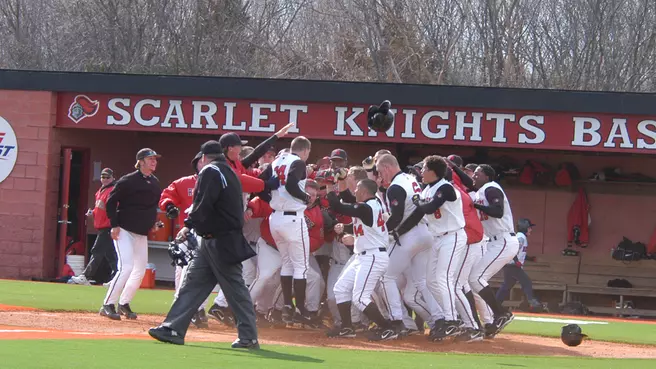History Capsule

Rutgers baseball is about winning and a commitment to playing the game the right way. Players who come through the program get a chance to grow on and off the field and are in a great position to play at the next level. The Scarlet Knights consistently put players in the pros, including three after the 2021 season. The 2000 team, which won the Big East regular season and tournament championships, featured 18 players who have played professionally at some level in the United States and two others who have played professionally overseas. The 2007 squad tied the school record for victories with 42 and hit the second-most home runs in school history with 63. Scouts took notice with a record six Scarlet Knights selected in the 2007 MLB Draft. The 2010 squad established the school record for home runs in a season with 71.
The pipeline to the pros continues each season with Scarlet Knights frequently represented in the Major League Baseball First Year Player Draft. Recently, Patrick Kivlehan was selected in the fourth round by the Seattle Mariners in 2012 after winning the Big East Player of the Year. Serafino Brito (2019, 28th round to Cleveland), Jawuan Harris (2018, Seventh round to San Diego), Nick Matera (34th round to Philadelphia), Howie Brey (2016, 31st round to Houston), Mark McCoy (2015, 29th round to Kansas City) and Brian O’Grady (2014, eighth round to Cincinnati) are the latest RU prospects selected in the MLB Draft.
Driven by a knowledgeable coaching staff committed to fundamentals and carried out by determined student-athletes, the baseball program has risen to be among the nation’s best, debunking the theory that northern schools cannot compete nationally. While practicing in cold temperatures and hitting indoors might not be the ideal conditions for preparation, especially when teams from the South are on the early portion of the schedule, it toughens the team and provides greater resolve heading into the season.
The program recently opened the Fred Hill Training Complex to allow the team to have a dedicated indoor home for workouts and practices. Spanning 22,500 square feet, the facility is equipped with state-of-the-art pitching machines, six batting cages, bullpen mounds and a full turf infield.
In building Rutgers with an emphasis on toughness, commitment and development, head coach Steve Owens has already elevated the program to its best placement in the Big Ten standings with progress made across the board despite dealing with unforeseen challenges amidst the coronavirus pandemic. In a spring 2020 vote of 90 head coaches from around the nation, Owens was selected as the most underrated head coach in college baseball in a Baseball America poll.
Playing in the Big Ten, the team has more coverage than ever with games airing on Big Ten Network and online at Big Ten+. The Scarlet Knights have tough competition week-in and week-out, regularly seeing top-25 opponents.
Before joining the Big Ten, Rutgers showed that it can win in the Big East (2003 Regular Season Champions and 2007 Big East Regular Season and Tournament Champions) and earned six NCAA Tournament appearances as part of the league. The heart and soul of the team is its players - a tight-knit group of Jersey kids who play the game the right way each and every time they step out on the field.
When Fred Hill took over the Rutgers baseball program in 1984, the Scarlet Knights were coming off a 13-22 record and had not advanced to the postseason since the 1970 season. Just two years later, Hill led Rutgers to the 1986 Atlantic 10 Championship and a spot in the NCAA Tournament. Rutgers would win the next eight regular season titles and, starting in 1986, four of the next six tournament championships.
In 1987, Rutgers posted its first-ever 30-win season, capturing 36 victories. The following year, the team eclipsed that mark with 38 wins, including its first NCAA Tournament victory (6-1 vs. Clemson) under Hill.
In 1990, Rutgers posted a 37-19 mark, won its first of back-to-back Atlantic 10 Tournament titles, and came within one win of the College World Series by advancing to the final of the 1990 Northeast Regional in Waterbury, Conn. After losing the opening game, 3-2, to North Carolina, the Scarlet Knights rattled off three consecutive wins to advance to the finals versus undefeated Georgia. Needing two wins to knock off the Bulldogs, Rutgers won the first, 4-3, before falling in the final, 20-9. Georgia would not lose another game on its way to the 1990 National Championship.
Despite leaving the Atlantic 10 following the 1995 season, Rutgers still ranks among the all-time leaders in the conference in regular-season titles (first with 10), tournament titles (first with six) and tournament wins (third with 26).
In 1996, Rutgers moved to the Big East Conference and, just two years later, captured both the regular season (17-3) and tournament titles. Rutgers repeated the feat twice more- once, in 2000, winning the regular season (18-5) and tournament crowns, and again in 2007 with a school-record 20-7 league mark and tournament title. The Scarlet Knights also captured the 2003 Regular Season Championship. RU is one of only three teams to win both the outright regular season and league tournament in the same season.
From 1996 to 2001, Rutgers finished either first or second in the Big East regular season standings and finished no lower than fourth in each of its first six seasons. In 2002, RU finished fourth in the regular season, but advanced to the Big East Championship game for the third time in seven seasons.
Following its fourth-place finish in 2002, Rutgers captured the 2003 Big East Regular Season Championship (its third since 1998), despite having 16 newcomers and just one senior pitcher on the roster.
An alumnus of the program, Joe Litterio took over for Hill on Feb. 20, 2014. He led the Scarlet Knights to 30 wins in his first season, including 11 in the last 14 games. The team finished tied for third in the American Athletic Conference. In 2016, the Scarlet Knights set a school record with 121 stolen bases to rank fourth in the nation.
Rutgers appeared in the NCAA Tournament 11 times under Hill’s watch, serving as the No. 1 seed and host for the 2000 Regional at Upper Montclair, the No. 2 seed at the 2001 Regional in Lincoln, Neb., and the No. 2 seed in the 2007 Charlottesville Regional, featuring No. 3 seed Oregon State, the eventual National Champion. In 2001, Rutgers advanced to the regional final, before the College World Series-bound Cornhuskers rallied for a 14-10 victory in the final inning. In 2003, RU traveled to Tallahassee, Fla., and went 1-2 in the NCAA Tournament, beating Jacksonville, 8-5, in the second round before losing to top-ranked Florida State, 17-7. In 2007, Rutgers took down Lafayette but was defeated twice by scores of 5-1 and 5-2 by eventual National Champion Oregon State.
In 30 seasons under Hill, Rutgers enjoyed 24 winning campaigns and 19 seasons of 30 or more wins. Three times since 2000 - 2000, 2001 and 2007 - the Scarlet Knights eclipsed the 40-win mark, including a program-best 42-17 record in 2001 and a school-record tying win total of 42-21 in 2007.
Rutgers has been ranked nationally during stretches of the last 30 years, including a high point of No. 14 (Baseball America) in 2000. Rutgers was ranked as high as No. 25 nationally in 2003 and No. 23 in 2002. It was ranked No. 29 by Collegiate Baseball in 2004. In 2007, Rutgers finished No. 30 nationally in the final Collegiate Baseball national poll and was ranked as high as No. 23 in the Baseball America poll at the end of the regular season. RU was ranked in three of Collegiate Baseball’s weekly polls in 2007.
Rutgers has had its share of All-Americans in the last 20 seasons, including two in 1999 and 2000. In 2000, shortstop Darren Fenster was the first Scarlet Knight to be named a First Team All-American since Jeff Torborg in 1963, and was one of 10 finalists for the Dick Howser Trophy, given annually to college baseball’s top performer. In 2002, Rutgers’ Bobby Brownlie was named one of five finalists for the Golden Spikes award, given each year to the top amateur baseball player in the nation. In 2004, outfielder Jeff Frazier earned several All-America awards and was a finalist for the Dick Howser Trophy as well. Frazier’s younger brother, Todd, was named a Freshman All-American in 2005 and garnered consensus First Team All-America laurels in 2007. He was also a semifinalist for the Brooks Wallace College Player of the Year Award, as well as a National Collegiate Baseball Writers Association District Player of the Year. In 2010, Pat Biserta was honored as an All-American while Steve Nyisztor and Tyler Gebler were each named Freshman All-Americans. Patrick Kivlehan earned the honor in 2012 after winning the first Big East league triple crown in history. Both Mike Carter and Gaby Rosa were named Louisville Slugger Freshman All-America after the 2014 season. Ryan Lasko became the first All-America pick in the Big Ten era.
Bobby Brownlie represented the Scarlet Knights on Team USA in the summer of 2001 and established himself as the team’s top hurler. He posted a 7-0 mark, including a 0.84 ERA, and allowed just 32 hits (30 singles) in 53.2 innings. He was also named the Louisville Slugger Preseason National Player of the Year in 2001. Todd Frazier represented Rutgers on the 2006 USA Baseball squad, guiding the team to the International University Sports Federation (FISU) World Championship Gold Medal in Havana, Cuba. Frazier, who started 22 of the National Team’s 28 games, played primarily right field, finishing with a .241 batting average (19-for-79), 11 RBI and 17 runs scored, including a double, triple and four home runs. Both Frazier and Kivlehan earned a silver medal for Team USA in the 2020 Tokyo Olympics.
Rutgers’ success is well-chronicled in the summer months as well. RU has frequently sent players to the Cape Cod League, including Cape All-Stars David DeJesus (Chatham, 1999), Bobby Brownlie (Falmouth, 2000), Val Majewski (Falmouth, 2001), Jeff Frazier (Chatham, 2003), Todd Frazier (Chatham, 2005) and the trend continued in 2010 with Casey Gaynor (Orleans) and in 2021 with Dale Stanavich (Brewster). In 2004, Johnny Defendis and Jeff Grose played with Chatham and Todd Frazier was named one of the Top 20 prospects on the Cape in 2005, playing for the A’s. In the summer of 2010, Steve Nyisztor was named the Most Valuable Player and Top Prospect of the prestigious Northwoods Baseball League. Jeff Melillo earned Perfect Game 2012 Summer Collegiate All-America First Team status after winning the batting title (.404) in the New England Collegiate Baseball League.
Now in a new chapter, Rutgers looks to continue to make history in the Big Ten.










